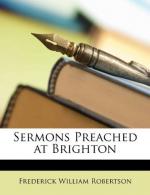I am tempted of God; for God cannot tempt to evil;
neither tempteth He any man.” He protested
against that unreal religion of excitement which diluted
the earnestness of real religion in the enjoyment of
listening. “Be ye doers of the word, and
not hearers only; deceiving your own souls.”
He protested against that trust in the correctness
of theological doctrine which neglected the cultivation
of character. “What doth it profit, if
a man say that he hath faith, and have not
works? Can faith save him?”
Read St. James’s epistle through, this
is the mind breathing through
it all:—all this talk about
religion, and spirituality—words,
words, words—nay, let us have realities.
It is well known that Luther complained of this epistle, that it did not contain the Gospel; for men who are hampered by a system will say—even of an inspired Apostle—that he does not teach the Gospel if their own favourite doctrine be not the central subject of his discourse; but St. James’s reply seems spontaneously to suggest itself to us. The Gospel! how can we speak of the Gospel, when the first principles of morality are forgotten? when Christians are excusing themselves, and slandering one another? How can the superstructure of Love and Faith be built, when the very foundations of human character—Justice, Mercy, Truth—have not been laid?
1st. The license of the tongue.
2nd. The guilt of that license.
The first license given to the tongue is slander. I am not of course, speaking now of that species of slander against which the law of libel provides a remedy, but of that of which the Gospel alone takes cognisance; for the worst injuries which man can do to man, are precisely those which are too delicate for law to deal with. We consider therefore not the calumny which is reckoned such by the moralities of an earthly court, but that which is found guilty by the spiritualities of the courts of heaven—that is, the mind of God.
Now observe, this slander is compared in the text to poison—“the tongue is an unruly evil, full of deadly poison.” The deadliest poisons are those for which no test is known: there are poisons so destructive that a single drop insinuated into the veins produces death in three seconds, and yet no chemical science can separate that virus from the contaminated blood, and show the metallic particles of poison glittering palpably, and say, “Behold, it is there!”
In the drop of venom which distils from the sting of the smallest insect, or the spikes of the nettle-leaf, there is concentrated the quintessence of a poison so subtle that the microscope cannot distinguish it, and yet so virulent that it can inflame the blood, irritate the whole constitution, and convert day and night into restless misery.
In St. James’s day, as now, it would




